April 7th, 2010SocialLearn update
In this presentation, I pick up where the OSRG symposium left off, and give a more in depth update on the SocialLearn project to the Knowledge Media Institute.
I set the scene by flagging the history of research around the concept of social learning, and noting some of the tidal forces that many now recognise as shaping the new education landscape. (The latter are not, however, the focus of this talk so detailed treatment awaits another forum.)
I then introduce some of the core building blocks that the project has identified in seeking an answer to the question, what does it mean to design social media tuned for learning/sensemaking? In our experience, this is the question being asked by organisations exploring the potential of collective intelligence and social learning (including but by no means limited to “Educational Institutions”). Are social learning media just regular social media, but used in a particular way through learner/educator intention and activity, or would they have particular affordances, e.g. designed to provoke deeper reflection and learning conversations, beyond the normal rapid-fire information and media exchange of vanilla platforms (i.e. without ‘learning flavouring’ added!).
One of the results of pondering this are some dimensions of the technology design space which researchers and practitioners can flex when seeking to scaffold social learning with software tools, whether f2f or online. Yes, we want the best of social media platforms, plus…
Moreover, this has motivated a number of conceptual building blocks that we are now experimenting with…
…which when pushed in an elevator, I summarise as social+conceptual networks…
Amongst the many pedagogical frameworks that we have drawn on, we note Engeström’s wildfire learning activities with interest: the idea is that the building blocks provide clues as to how to render his proposed wildfire constructs of inquiry, trails, history, consolidation, argument, landmarks, places, and exploration.
In the final part of the talk, I move to a demo of the SocialLearn Space that is being constructed to provide cross-platform widgets for epistemic communities of inquiry, plus the tools to build, from their myriad identities and activities in the cloud, an aggregated learner profile, thus providing the basis for human and machine recommendations of people and resources.
As we noted in our new year update, SocialLearn’s immediate focus is on testing the concepts with communities within the university. PhD students and the wider researcher community are a particular focus right now (although with the blurring of e-learning and e-research/scholarship, by extension, in a course-oriented context we’d see these as tools for authentic student inquiry). However, when we pilot the tools they will be open to the world, so watch this blog for news.
The slide below shows schematically how the SocialLearn Space provides an integrational layer between currently siloed user activity within the university, and extending out to the cloud, providing the four core functions of Profile, UI, Social Graph and Services:
Developers…
Following the Open U’s strategic partnership with Google Apps for Education, we are experimenting with Google Gadgets, OpenSocial and FriendConnect to implement the platform, hosted in a Drupal-based portal. As a learner, we provide you with the tools to manage your learning widgets (Google Gadgets), connect your identities (e.g. sign in with OpenID, Facebook, Google, Yahoo!, LinkedIn, etc), maintain your profile (your learning history, interests and where you publish your learning journal, media, etc), and monitor your peers’ activity, and system recommendations through your personalised homepage.
As we demo in the KMi seminar, we’re dropping Gadgets into a range of Open U platforms as we put it through technical and user experience tests. Here’s one example, with Gadgets running in an experimental version of the Open U’s Cloudworks knowledge sharing environment (these are barebones gadgets – no graphic design work done yet!)…
One of the reasons we’re hosting the SocialLearn team in KMi is to facilitate connections with ongoing semantic web R&D. For instance, from the post-talk discussions, it’s clear that semantic technology could make key contributions to the challenges of merging social graphs from diverse sources, making sense of folksonomic tags, providing good multimedia search results, and recommendations based on content, peer activity and learning intentions. Aspects of the SocialLearn infrastructure will be released open source, with developer events now being planned.
So, you think you have a great learner gadget or computational service?
Prove it! My personal vision for SocialLearn is that it comes to serve as a commons-based innovation space: new end-user tools and backend services can be plugged in and out of a cleanly defined, scaleable architecture, for applied research on a large dataset and user base, enhancing the learner experience with the services and gadgets that add most value — as deemed by the people at the centre of a social media platform tuned for learning: learners and educators. You and your team can doubtless improve on the virtual rack of recommendation engines, provide more effective visualizations of social or conceptual networks, or provide cool connections to the many other tools out there that we want to dnce with. Think social media app store — but yes you got it: tuned for learning/sensemaking (and often, open source).
Sounds fun. But here for me is the kicker: if we can get it right, what we’d be doing collectively is building a suitably anonymised dataset which could become a commons-licensed (non-commercial?) resource for large scale social learning R&D. Every gadget and service is contributing data that can be mined and reasoned about. Haven’t worked the small print on that one through yet!…
Your views welcomed.

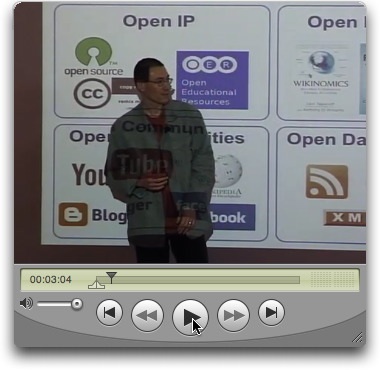
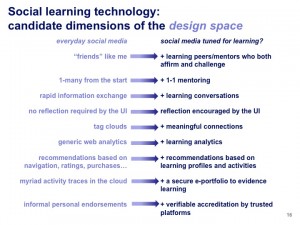
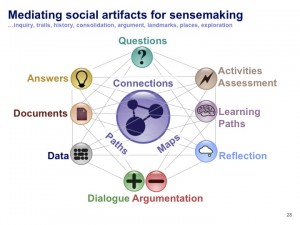
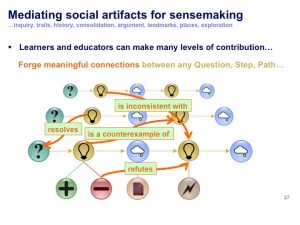
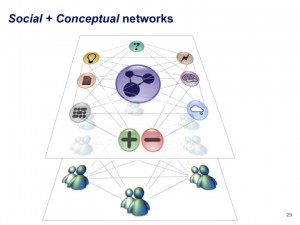
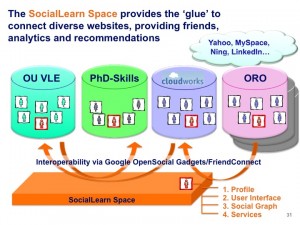
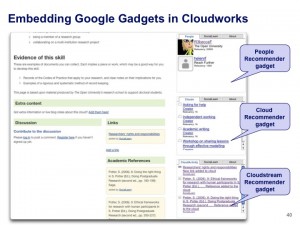
April 8th, 2010 at 12:30 am
[…] This post was mentioned on Twitter by sociallearn and Nicola Osborne, Simon BuckinghamShum. Simon BuckinghamShum said: RT @sociallearn: Open U's SocialLearn project: update + webcast just posted… http://bit.ly/9yplBJ […]